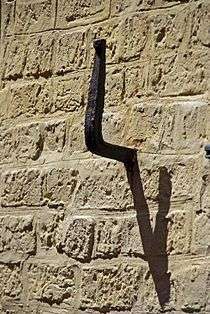kāsis
Latvian

Kāsis
Etymology
The origin of this word is not clear. It may stem from Proto-Indo-European *ḱāk-, *ḱak- (“branch, pole”), via metathesis (from *kāḱ- to Proto-Baltic *kāš- to Latvian kāsis), with the original meaning being “bent branch.” Cognates would then include Lithuanian dialectal kóšis, and maybe also Sanskrit काशिः (kāśiḥ, “hollow of the hand”), if indeed its older meaning was “meander,” “bent, crooked one.”
Proto-Indo-European *ḱāk-, *ḱak- without metathesis would have yielded the dialectal Latvian term saķis (“bifurcated ending”), Lithuanian šakà (“branch”), and Sanskrit शाखा (śākhā, “branch”).[1]
Pronunciation
- IPA(key): [kàːsis]
Noun
kāsis m (2nd declension)
- hook (object with a curved, sharp tip used for suspending or hanging)
- dzelzs, tērauda kāsis ― iron, steel hook
- uzkabināt uz kāša ― to hang (something) on a hook
- pakārt katlu kāsi virs uguns ― to hang the pothook over the fire
- nocelt podu no kāša ― to lift, remove a pot from the hook
- stick, bar with a hook or crooked tip
- izvilkt ar kāsi ūdens spaini no akas ― to pull a bucket of water from the well with a hook
- (something having) the form or shape of a hook
- dzērves, zosis un pīles lido kāsī vai rindā ― cranes, geese and ducks fly in a hook or in a row
- saliekt stiepli kāsī ― to bend the wire into a hook
Declension
Declension of kāsis (2nd declension)
Derived terms
References
- Karulis, Konstantīns (1992), “kāsis”, in Latviešu Etimoloģijas Vārdnīca (in Latvian), Rīga: AVOTS, →ISBN
This article is issued from
Wiktionary.
The text is licensed under Creative
Commons - Attribution - Sharealike.
Additional terms may apply for the media files.